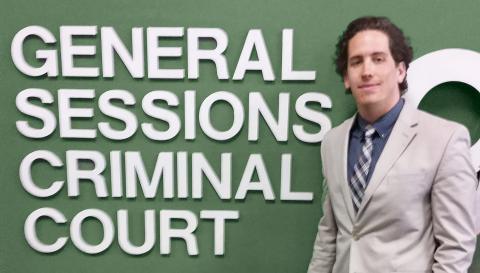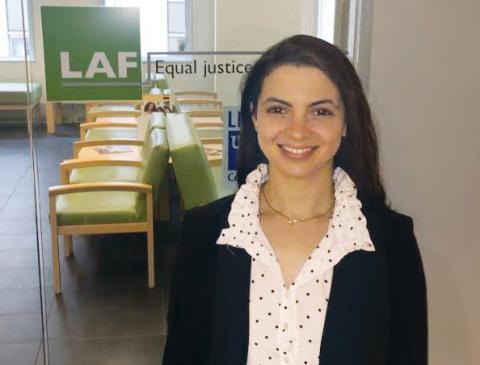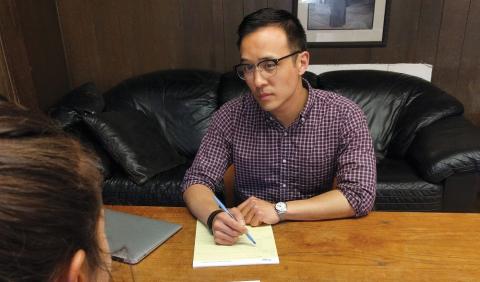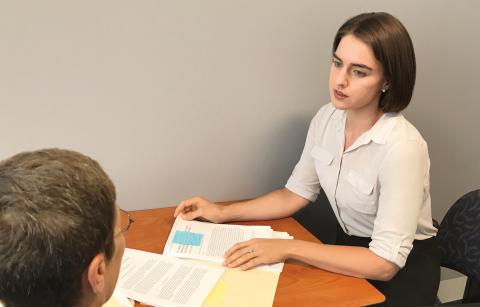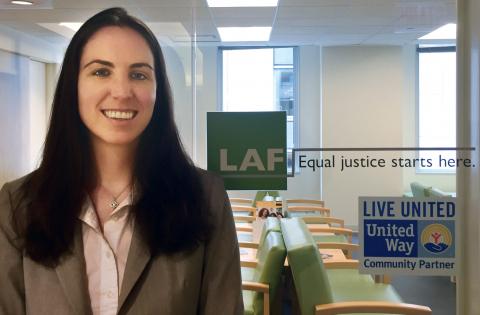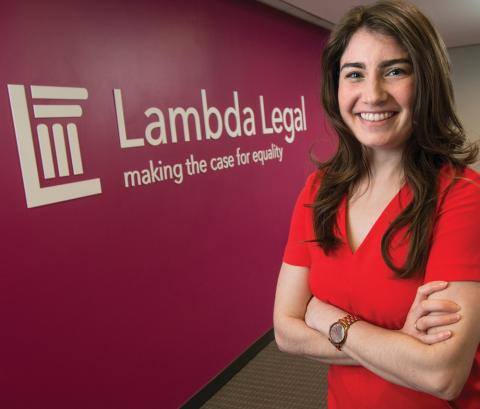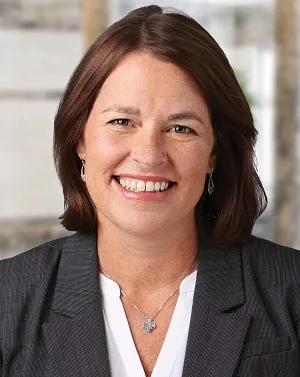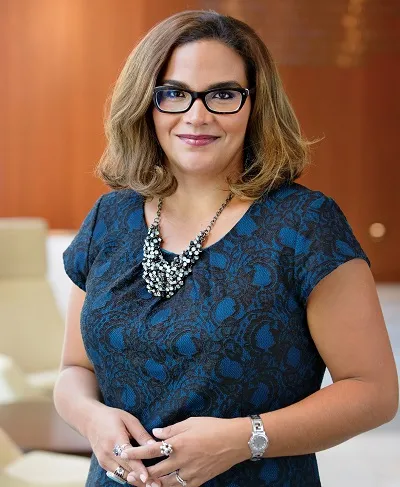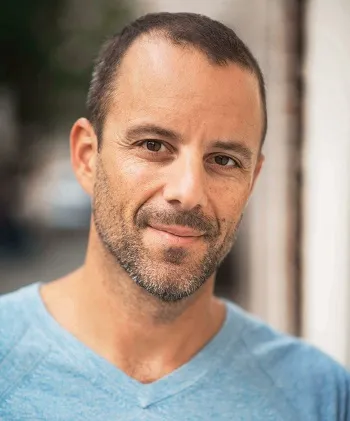Diving into the Deep End

The plan was to design her dream job.
And so during her third year at the Law School, Kara Ingelhart, ’15, developed a program serving low-income LGBTQ youth, asked the Midwest Regional Office of Lambda Legal to host it, and applied for a prestigious Skadden Fellowship. When she was chosen, she knew her celebration marked the start of a daunting journey: she had 24 months to turn a rare funding opportunity into a lasting effort to serve the LGBTQ community, all while learning how to be a lawyer and setting the tone for her own nascent career.
Now, walking through the Lambda Legal office nearly two years after her arrival—past the pushpin-button art of their press clippings, through the little hallway she scooches her chair into each morning for a quick coffee chat with the lawyer at the next desk, and finally into the small cubicle with the rainbow flag and the “Nevertheless, She Persisted” magnet and the “We Object to Transphobia” placard—Ingelhart sometimes can’t believe that she’s here, doing this, right now. Or, more extraordinarily, that she gets to keep doing it. Earlier this year, the organization asked Ingelhart to join their staff as a Lambda Legal Fellow after her Skadden Fellowship Foundation funding ends in September.
“You design a Skadden Fellowship to be the job you want, so you can advocate for those in need by doing exactly what you think you are best suited to do,” Ingelhart said one afternoon last summer. “But you get just a short time to do it. To have it extended is—it’s amazing. It means I don’t have to start wrapping up my project or preparing to hand it off to someone else.”
The work has been exhausting and exhilarating in ways Ingelhart both expected and never imagined. She’d been a licensed attorney for less than a year when she helped deliver oral arguments in a five-and-a-half-hour injunction hearing in federal district court in Evancho v. Pine-Richland School District and helped make the case—successfully—that the equal protection guarantee bars schools from discriminating against transgender students, including in bathroom assignments. She’d joined the nation’s oldest and largest LGBTQ legal advocacy organization at a pivotal time: in the immediate wake of the landmark same-sex marriage victory in Obergefell v. Hodges and just as battles over transgender rights were heating up. The energy at Lambda was palpable when she arrived, a celebratory buzz mixed with a stalwart focus on the struggles ahead. And even in her second year, when the mood darkened amid growing concerns that the new Trump administration and Republican Congress would undo some of their progress, she could feel the dedication and passion around her.
“Every single day I feel like I’m really doing something,” Ingelhart said. “I may not be saving the world, but I’m advancing arguments on behalf of marginalized people, arguments that might not be made were it not for the fact that there’s one more person—me—out there as a resource.”
Law School students and alumni have a strong track record of landing prestigious public interest fellowships. Eighteen Law School students or alumni have been awarded Skadden Fellowships since the program began in 1988, and others have earned awards like the Equal Justice Works Fellowship or the Business and Professional People for the Public Interest’s Polikoff-Gautreaux Fellowship, which takes its name from a Law School alumnus and his landmark public housing lawsuit. (One alumnus, Adam Gross, ’95, went to work for BPI as a Skadden Fellow more than 20 years ago and is still there, as the director of Affordable Housing and the organization’s Justice Reform Program.) In addition, each year six or seven students are awarded one of the Law School’s donor-funded Postgraduate Public Interest Law Fellowships. The winners have typically established themselves as public interest superstars, and the fellowships offer them unparalleled opportunities to launch careers that otherwise might have been slowed by funding struggles.
But being awarded a fellowship, no matter how hard-fought, is only the prologue. It’s what happens later—once they’ve confronted injustice and come to know the nuances that feed it—that connects one’s academic experience to the realities of public interest law. In just one or two years, fellows learn to apply what they’ve learned in law school, often in high-pressure, fast-moving, deeply human situations. This growth happens in both the small moments—when they’re trying to figure out how to get a teen client to return a call, or summoning the courage to speak in a room of seasoned advocates, or struggling to walk the line between empathy and overinvolvement—and in the surprisingly big ones.
“In February, I sat as a deputy attorney in a first-degree murder trial, where our client maintained his innocence and was acquitted,” said Andrew Sullivan, ’16, who earned a Postgraduate Public Interest Law Fellowship to work as a public defender in Shelby County, Tennessee. “It was beyond nerve-wracking, the responsibility to protect an innocent man from a lifetime in prison—but I find defense in routine misdemeanor cases equally compelling, because although clients face less jail time, a criminal conviction might mean a lifetime of losses in employment, housing, and more.”
These are the stories of how public interest fellowships help build new lawyers.
Andrew Sullivan, ’16: Finding Moments of Beauty
Nine months into his yearlong fellowship at the Shelby County Public Defender’s Office, Sullivan had represented clients in 319 misdemeanor cases and 16 felonies.
He works mostly in a misdemeanor courtroom, defending people charged with crimes ranging from criminal trespass, to drug possession, to assault. Despite the caseload, Sullivan said that many of the most fulfilling moments in his job come from the day-to-day interactions with his clients.
“My clients demonstrate how worthy and relatable people can be regardless of innocence or guilt,” Sullivan said. “None of us is perfect. My clients may be unique in their struggle with addiction, mental health, or extreme poverty, but I rarely find it difficult to empathize. I think that working as a public defender means doing everything I can to combat ‘otherization’—my goal is to put prosecutors, judges, juries in my clients’ shoes. This is the only way to understand how, although a person made a mistake, he or she isn’t a bad person.”
It was these interactions with clients that first drew Sullivan to public defense—the summer after his 1L year, he worked at the New Orleans Public Defender’s Office and connected the dots between Civil Rights–Era discrimination and issues in the criminal justice system today. Navigating the system, he added, helped prepare him for some of the difficult decisions he would have to make when advocating for his clients as a public defender in Shelby County.
“The goal in every case is to avoid jail time and collateral consequences of a conviction, but unfortunately the odds are often stacked too far against us,” Sullivan said. “Often, indigent defendants are unable to post bond and face lengthy pretrial incarceration if they decide to fight their case. I file every motion I can, but for many clients the quickest way to be released is to plead guilty. In these cases, I struggle with whether I’m making any difference or only assisting in the processing of pleas. But recently a client reminded me that my job is more than the legal battle. Before he signed the plea, I remember he very sincerely thanked me, not only for all the legal motions, but for making him feel worth fighting for.”
Sullivan earned his fellowship in partnership with Gideon’s Promise—a network of attorneys working to improve the delivery of public defense by offering supplemental training and a sense of community to new defenders, predominantly in southern states. The arrangement allowed Sullivan to work in a public defender’s office right out of law school with the added benefit of support from the Gideon’s Promise network. It’s been an essential start to his career as a public interest lawyer, Sullivan said—and he’s grateful that the fellowship frees up funding for Shelby County to spend their resources on improving services for clients and hiring additional attorneys.
“I’m getting great experience in lawyering,” he said. “But more importantly, I’m seeing firsthand the collision of criminal justice with poor communities across the country. Whether I continue in criminal defense or someday transition to another branch of reform, I’ll always benefit from the perspective of a public defender.”
Rachel Zemke, ’16: Learning to Shoulder Heartbreak
The hardest part of Rachel Zemke’s first year as a legal aid attorney was learning to protect herself in a job that often requires intense interpersonal engagement.
Zemke, ’16, had long hoped for an Equal Justice Works Fellowship when she was awarded one to launch a program representing domestic violence survivors facing debt collection, identity theft, credit history, and other economic issues. LAF, the largest provider of legal aid in Cook County, had agreed to host Zemke and her program, and last fall she began taking client referrals.
The stories weren’t always easy to hear. In one case, a client had run away from a car crash while trying to escape an ex-boyfriend who had forced her into the car against her will. The ex-boyfriend claimed that the crash was her fault, and a few years later, his insurance company filed a subrogation claim, trying to recoup damages from her.
“She was terrified,” Zemke said. “It wasn’t a lot of money, but it was enough.” Zemke successfully convinced a judge to dismiss the charges with prejudice, which was a clear win. But she’d also helped prepare the woman for the possibility of testifying, a process that meant helping her develop a comfort with talking about what had happened that day, and possibly even confronting the ex-boyfriend in court.
It was hard, Zemke discovered, to take on the right amount of emotion: helping the woman required understanding and objectivity, but in proper balance.
In that case and others, her supervisors at LAF offered guidance and counsel, and Zemke gradually began learning to walk the fine line between empathy and entanglement.
“If you are a good attorney, you understand what’s going on in someone’s life beyond just the legal issue in front of you. But if you get too enmeshed in all of the other things that are going on in someone’s life, it can be detrimental to your ability to represent them in their legal needs,” Zemke said. “I feel like it’s something I’ll struggle with to some extent my entire career. It’s a very delicate balance to keep.”
Over her first year, she took on about 30 cases and built her arsenal of skills, sometimes in a trial-by-fire kind of way.
“In early April, I had a 25-minute oral argument in front of a judge on a fully briefed motion, and that was terrifying and exhilarating,” she said. “I had written and contributed to all of the briefing. We lost one part and won one part. But each time you do something, you’re less scared the next time. There’s a real blossoming that happens this first year. At the beginning, you know so little—and then you’re just doing it, with supervision and support of course, and you’re the attorney.”
Joel Kim, ’16: A Focus on Housing and Homelessness
As a Postgraduate Public Interest Law Fellow, Joel Kim, ’16, worked with the Lawyer’s Committee on Civil Rights (LCCR) to run a drop-in legal clinic for indigent people in one of San Francisco’s poorest neighborhoods. He was grateful to serve an underrepresented population and develop the skills to assist clients struggling with poverty and mental illness.
“I was there twice a week, sometimes by myself and sometimes with pro bono attorneys,” Kim said. “We had our doors open, and we would answer whatever questions people had. A lot of the work there was being able to ascertain what people needed and how we as lawyers could help them. And even if it wasn’t a legal issue, it was important to have empathy and good listening skills.”
In the clinic, Kim helped clients navigate housing issues that ranged from unsafe living conditions to eviction. Working at LCCR—an organization that aims to protect and advance the legal rights of the marginalized population of the Bay Area—Kim learned how a no-cost legal clinic like this could have an immediate effect on his clients’ lives.
“I once had a client come in who had questions about the legal paperwork he had received,” Kim said. “He didn’t know how to read it and didn’t know what the legal terms meant. I explained it briefly and he left feeling much more comfortable knowing what his legal rights were. That was really great, that I could help him in such a tangible way.”
Kim first decided to focus on housing law and homelessness after spending his 1L summer at Christian Legal Aid of Los Angeles. There, he worked at a drop-in legal clinic similar to the one he ran for LCCR, and realized that housing issues often played a role in many of the other hardships low-income clients faced.
“I noticed that housing came up again and again, whether it was people with eviction questions, or habitability,” Kim said. “Even if people didn’t explicitly have a housing issue, they were often connected with housing. And after that summer, I knew it was something I wanted to explore.”
Once Kim had decided to focus on housing in the public interest realm, he made it his goal to get as much direct experience working with clients as possible. With the Postgraduate Public Interest Law Fellowship, he was able work for an organization that serves an underrepresented population right out of law school.
“LCCR would not have had the funding to pay for me to work there,” Kim said. “So for me to get this experience as a brand-new attorney—running an entire program and working directly with clients every single week—was remarkable. Having this opportunity made a big difference.”
After the yearlong fellowship ended, Kim began working at the Homeless Action Center, where he helps homeless clients with the bureaucratic and arduous process of applying for disability benefits. Armed with his experiences from the fellowship, Kim felt prepared to tackle the next step in his legal career.
“These fellowships are really important to provide opportunities for new graduates to get experience, and also to provide much-needed attorney resources for nonprofits that can then use that money for their clients,” he said. “It’s critical for the fellows, the organizations, and the clients that we continue to have fellowships like this.”
Mara Easterbrook, ’16: Exacting Change through Policy
For Mara Easterbrook, ’16, the most surprising and rewarding part of her Polikoff-Gautreaux Fellowship at Business and Professional People for the Public Interest (BPI) was being able to focus on higher-level policy advocacy right after graduating from the Law School.
“It’s not something I specifically trained for in law school, though my Law School experience did prepare me for it,” said Easterbrook, who is one year into her two-year fellowship. “It’s a new skill set, and one that I find very rewarding. It’s given me the opportunity to exact change at a much broader level, and coordinate with experts across the country about issues including how a public housing department should be run, and how a city’s police department should be run.”
During her fellowship at BPI—a public interest law and policy center working to address social justice and quality of life issues in the Chicago region—Easterbrook has focused primarily on public housing and criminal justice reform. On the public housing front, she has been working with the Chicago Housing Authority, through litigation and negotiation, to ensure that low-income residents have housing opportunities in less-segregated areas of the city. Her work on criminal justice reform has centered on the issues of police department reform, exploring potential litigation avenues to a consent decree that would impose federal oversight and independent monitoring of the Chicago Police Department, and cash bail reform.
“The system strongly incentivizes innocent, poor people to plead guilty or forces them to stay in jail until their trial, simply because they can’t afford bail,” Easterbrook said of Illinois’s cash bail system. “It’s one of the junctures of our criminal justice system where differences in wealth most obviously impact your outcome once you’ve been brought into the system.”
Easterbrook decided to focus on public interest law after working as a college intern in the legal department of the National Immigrant Justice Center, where she saw firsthand how vulnerable populations often struggle to obtain legal assistance and representation. Her commitment to public interest grew when she worked at the Texas Civil Rights Project and the Cook County Public Defender’s Office during the summers after her first and second years of law school.
BPI adopts a multidisciplinary approach to solving the quality-of-life issues that affect low-income, segregated communities in Chicago—it was this approach that first attracted Easterbrook to the organization, and she was excited to put it into practice during her fellowship.
“It’s really important that issues like these are considered in tandem, because they are so interrelated,” she said. “BPI works on criminal justice, early education, and public housing—being able to learn about these issues as they relate to each other and to work on them together makes BPI efficient as an organization and has been really helpful for me in getting my start as a lawyer.”
BPI’s Polikoff-Gautreaux Fellowship, Easterbrook said, gave her the unique opportunity to be fully integrated as a staff attorney for the organization, and thus advocate for public housing and criminal justice reform at the same time. Getting this experience right out of law school, she added, was crucial in establishing herself as a public interest lawyer.
“As a 3L student looking to work in public interest for the rest of their career, it can be really hard to find that first placement, because the public interest hiring market can be so tight,” she said. “Receiving this fellowship has been the thing that has started my legal career. It’s given me my first year of experience as a young attorney, and in an unexpected but welcome way has introduced me to the work of being a policy advocate and policy analyst.”
Jamie Schulte, ’15: Giving a Voice to Teens in Need
During her first year as a Skadden Fellow at LAF, Jamie Schulte, ’15, noticed a pattern among the at-risk youth she represented. A surprising number believed they’d been expelled from school—some even believed they’d be arrested if they tried to return—despite never having gone through a formal hearing process.
“This is not legal—for a student to be expelled, he or she must have an expulsion hearing with a hearing officer, and the school board or equivalent must make the final decision,” said Schulte, who worked as a middle school teacher before law school. “But kids and parents often don’t know this.”
Schulte had designed her project to serve students in special education and disciplinary matters in Chicago’s growing “options schools” program, and this was just the kind of advocacy she hoped to provide. The relatively new alternative programs, which are affiliated with the Chicago Public Schools but mostly run by outside organizations, serve expelled, academically unsuccessful, or otherwise at-risk students. But they often use online coursework and shortened hours, and there aren’t a lot of data about their effectiveness. Schulte’s aim was to provide both direct representation to students who were either part of an options school or likely to be referred to one, as well as analyze data that would help her better understand the effectiveness of the options-school approach. The Skadden Fellowship, which was awarded near the end of her clerkship on the Fifth Circuit Court of Appeals, meant she had the funding to proceed.
By the fall of 2016, Schulte was taking cases—and the claims of no-hearing “expulsions” began to surface. In one case, Schulte had two sibling clients who had been involved in a fight and said they’d been told by school staff that they would be expelled if they returned to school.
“As a result, they did not go to school for several weeks,” Schulte said. “Among other things, they missed their final exams, which resulted in them failing a number of classes. I got the case at this point. Once I received the school records—which the school had not provided to the students or parent—it reflected that they were officially suspended for only a few days.”
The students ultimately decided to transfer to a different school, and Schulte helped them enroll. She also convinced the initial school to modify the attendance records to show that the absences had not been unexcused and arranged for the students make up their finals. The siblings resumed their education—this time, with a better understanding of their rights.
“I love when I’m able to help my clients understand the system and develop their own tools and their own voices,” said Schulte, who has traveled to nearly every corner of Chicago to meet with students and their families. “It’s important that they’re able to advocate for themselves.”
Her work can be emotionally complex, and she draws on her pre–Law School work as a teacher, as well as the time she spent at the Law School working on the Criminal and Juvenile Justice Clinic and as a teaching assistant in Professor Emily Buss’s high school/law school Juvenile Justice class. Her clients sometimes get arrested, and they aren’t always easy to reach, and they don’t necessarily pick up the phone when she calls.
“I text with them, but I always start by saying, ‘This is Jamie Schulte, and I’m your lawyer,’ which they think is funny,” Schulte said. “But even when I’m working to connect with them on their level, I need to keep up a certain amount of formality and remind them that I’m their lawyer and not their friend.”
Her supervisors at LAF, she said, have helped her navigate the ups and downs.
“It can be very draining, and it’s a lot of hours—especially because I’m a new lawyer and everything takes me longer than if I’d been doing this for a long time,” she said. “But, honestly, the emotional exhaustion is harder than the physical. My target population has a lot of issues, and it can be really hard. But I have a really supportive supervisor and coworkers, and that helps.”
Zemke, whose office is next to Schulte’s, is a constant source of support. “We share a wall—our offices are right next to each other,” Schulte said. “Our projects are very different, but we learn from each other.”
Schulte has found that she loves the community of public interest lawyers, with its quick learning curves and supportive atmosphere. Just nine months in, she marveled at how much she’d learned in such a short period of time.
“It seems like so long ago that I didn’t know what an MDR was,” she said, referring to Manifestation Determination Review. “But it also seems like I just started. Time moves differently in public interest.”
Kara Ingelhart, ’15: Paying It Forward
The hope for most public interest fellows is that their work will lead to permanent employment. Most Law School fellows find jobs in public interest, some at other organizations—and some, like Ingelhart, with their host.
Lambda’s website describes Ingelhart as “an emerging leader and passionate advocate for the civil rights of LGBT people” and last year, she was recognized as one of 2016’s 30 under 30 best and brightest individuals in Chicago’s LGBTQ community by the Windy City Times. In addition to the Evancho case, she’s worked on many others, including F. V. v. Armstrong and Arroyo v. Rossello, where she represents transgender Idahoans and Puerto Ricans who have been denied birth certificates with accurate gender markers.
She’s still working on finding time for herself—she has guitars at home that she rarely plays, though she hopes to find time for music one of these days—and, like her peers, she’s continually working to hone her skills and confidence.
“I didn’t struggle with people caring about my project or caring about youth, and I didn’t have trouble finding community support or support from my supervisors,” she said. “But to be a good advocate, you have to know what you don’t know, and sometimes that’s hard to find out, and it is nerve-wracking to ask. I was a first-year attorney at an organization that typically only hires people with four or five years of experience, advocating in rooms where the collective experience is decades and decades of excellent advocacy. That was really overwhelming.”
She still remembers the surprise she felt upon learning that the other attorneys on the Evancho case wanted her to help deliver oral arguments.
But in two years, Ingelhart has come into her own. Her toolkit now includes two years of practice, and she’s gained the kind of confidence that comes from jumping into the deep end of the pool and finding out that you can, in fact, swim. She’s more comfortable answering questions, and asking them, too. And she’s more convinced than ever that she’s in the right place—and that she’s there because of the support she received along the way.
“The reason I wanted to do this work is because I believe in paying it forward,” she said. “I’ve had a lot of success, but I believe that my life could have taken a number of different turns were it not for the support of both individual people and institutions like the University of Chicago. And the more I do work in the criminal and juvenile legal systems, the more I believe that all the switches were turned on in my favor. I want to keep advocating for the people who need to be lifted up—so they too can find the opportunities that every individual deserves.”
An Entry to Public Interest Work
Public interest fellowships offer recent graduates the opportunity to begin their public interest careers right away. Whether they earn a fellowship from the Law School or secure one with an outside foundation, these fellows may serve the public interest by designing their own projects, being fully integrated as attorneys within an organization, or working specifically to improve legal representation in an underserved community. Here are some of the competitive fellowships that have helped Law School graduates get their start as lawyers in the public sector.
The University of Chicago Law School Postgraduate Public Interest Law Fellowship
The University of Chicago Law School Postgraduate Public Interest Law Fellowships are awarded to competitively chosen graduating students who develop public interest fellowship projects with public-sector host organizations. Thanks to the generosity of alumni funders, each fellow works full-time for one year following graduation at an eligible public service host organization on public interest legal issues:
- James, ’85, and Patrice Comey, The James and Patrice Comey Fellowship Fund
- Barbara Fried, ’57, Barbara and Mark Fried Fund for Public Interest
- The Kanter Family Foundation, Mikva Fellowship Program Fund
- Lillian Kraemer, ’64, Lillian Kraemer Post-Graduate Public Interest Fund
- David, AB, ’60, JD, ’63, and Susan Kreisman, The Kreisman Initiative on Housing Law and Policy
- Mark Mamolen, ’77, The Mark Mamolen Post-Graduate Fellowship Fund
- Steven Marenberg, ’80, and Alison Whalen, ’82, The Steve Marenberg and Alison Whalen Public Interest Fellowship Fund
- William Von Hoene, ’80, and Nikki Zollar, The Charlotte Von Hoene Fellowship Fund
The Skadden Fellowship
The Skadden Fellowship Foundation provides two-year fellowships to young lawyers to pursue the practice of public interest law on a full-time basis. Their guiding principle is to improve legal services for the poor and encourage economic independence. According to the Skadden Foundation, 90 percent of former fellows remain in public service, and almost all of them continue working on the same issues they addressed in their original fellowship projects.
Business and Professional People for the Public Interest’s (BPI) Polikoff-Gautreaux Fellowship
Each year, BPI hires a recent law or policy school graduate to become a Polikoff-Gautreaux Fellow for a two-year term. The fellowship program is designed to prepare the next generation of public interest professionals, and Polikoff-Gautreaux Fellows have gone on to pursue successful careers in nonprofit leadership, affordable housing law, legal aid, civil rights advocacy, and government.
Equal Justice Works
Equal Justice Works offers postgraduate fellowships that provide a blueprint for new lawyers to turn their passions into public interest careers that are truly their own. With the support of their host organizations, sponsors, and Equal Justice Works, fellows pursue projects of their own design and create lasting change for their communities over the two-year fellowship.
